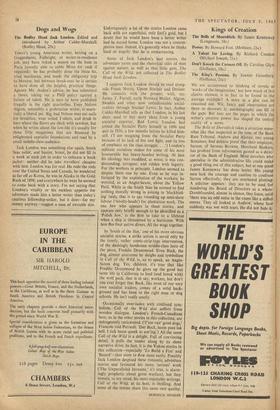Dogs and Wogs
The Sodley Head Jack London. Edited and introduced by Arthur Calder-Marshall. (Rodley Head, 25s.) ToonY's young American writer, betting on a Guggenheim, Fulbright, or writer-in-residence job, may have risked a season on the bum in Paris (usually able to cable Mom for cash if required): he has probably done the Ibiza bit, tried marijuana, and made the obligatory trip to Mexico; but between break-outs he is certain to have done all the helpful, practical things. Against Mr. Auden's advice, he has submitted a thesis, taking out a PhD policy against a failure of talent. He is sure to. have published frugally in the right quarterlies. Even Nelson Algren, ostensibly a proletarian writer, is essen- tially a liberal pet. Big, bad Nelson may eat nails for breakfast, wear soiled T-shirts, and drink in bars where the floors are thick with sawdust, but when he, writes about the low-life it's usually for those little magazines that are financed by enlightened capitalist foundations and read by a small middle-class audience.
Jack London was something else again. South Seas sailor, seal hunter, boxer, he did not fill in a week at each job in order to enhance a book jacket: neither did he take travellers' cheques with him. London was for real. He rode the rods over the United States and Canada, he wandered as far off as Korea, he was in Alaska in the Gold Rush of 1898; and everywhere he went he seemed. to come back with a story. I'm not saying that London's vitality or his reckless appetite for adventure made him a better writer than today's cautious fellowship-seeker, but it does—for my money anyway—suggest a man of enviable size.
Unfortunately a lot of the stories London came back with are superficial, only fool's gold, but I doubt that he would have been a better writer had he stayed home. London was not a contem- plative man. Indeed, it's generally when he thinks hard or angrily that he is embarrassing.
Some of Jack London's best stories, the adventure yarns and the rhetorical tale's of Man against nature, as well as that little gem, The Call of the Wild, are collected in The Bodley Head Jack London.
I suppose Jack London should be read along- side Frank Norris, Upton Sinclair and Dreiser. He connects with the present, with, say, James T. Farrell, early Norman Mailer, Algren, Swados and other now unfashionable social- realists through Sinclair Lewis. In fact, Arthur Calder-Marshall tells us that London, in his last days, used to buy story ideas from a young socialist reporter, Red Lewis. London had joined the Socialist Party himself in 1896 and quit in 1916, a few Months before he killed him- self. ('l am resigning from the Socialist Party because of its lack of fire and fight, and its loss of emphasis on the class struggle.. ..) London's militant socialism Makes for some of his most honourable but heavy-handed writing. At best his ideology was muddled, at worst, it was con- descending, arrogant, and ridden with bigotry. For the workers in principle, London seemed to despise them one by one. Even as he was in- furiated by the exploitation of the workers, he worried, as an Anglo-Saxon, about the Yellow Peril. While in the South Sias he seemed to find nothing morally wrong in joining in `blackbird- ing' raids, that is to say rounding up semi-slave labour ('woolly-heads') for plantation work. The one Jew who appears in these stories, and appears only briefly enough to be identified as a `Polish Jew,' is the first to take to a lifeboat when a ship is threatened by a hurricane. With him flee four native divers. All the wogs together.
In `South of the Slot,' one of his more obvious socialist stories, a strike action is saved only by the timely, rather comic-strip-type intervention, of the dashingly handsome middle-class hero of the piece, Freddie Drummond. Even Buck, the dog, almost overcome by sleighs and symbolism in Call of the Wild, is, so to speak, an Anglo- Saxon dog. Yes, children, it's true that like Freddie Drummond he gives up the good but tame life in California to lead (and breed with) the wolf pack, that is to say, workers, but don't you ever forget that Buck, like most of our very own socialist leaders, comes of a solid back- ground and has been to the right man or dog schools. He isn't really smelly.
Occasionally over-laden with confused sym- bolism, Call of the Wild also suffers from wooden dialogue. London's French-Canadians here, as in the other stories in this collection, are outrageously caricatured. ('T'ree vair' good dogs,' Francois told Perrault. `Oat Buck, heem pool lak hell. I tich heem queek as anling.) All the same Call of the Wild is a delight. Full of convincing detail, it pulls the reader along by its sheer narrative drive. In fact, it is the Yukon stories in this collection—especially `To Build a Fire' and liatard'—that seem to flow most easily. Possibly Jack London despised these romantic adventure stories and favoured his more `serious' work (The Unparalleled Invasion,' it's true, is alarm- ingly prophetic about germ warfare), but they remain, to my mind, his most enjoyable writings. Call of the Wild, at its best, is thrilling. And some of the stories share this same rare quality.
MORDECAI RICHLER






































 Previous page
Previous page